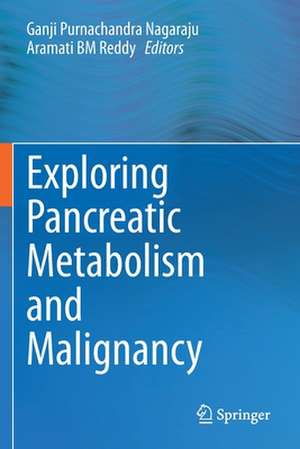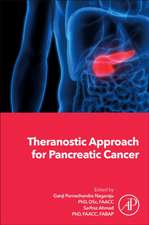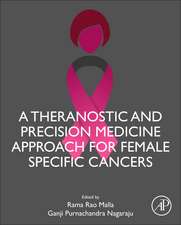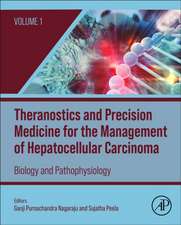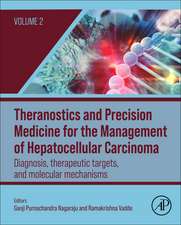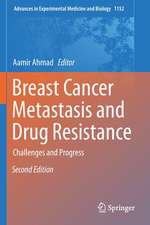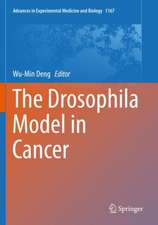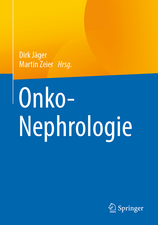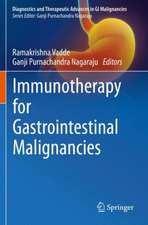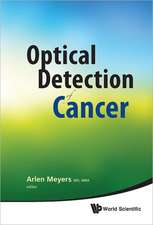Exploring Pancreatic Metabolism and Malignancy
Editat de Ganji Purnachandra Nagaraju, Aramati BM Reddyen Limba Engleză Paperback – 10 dec 2020
Lastly, the bookoffers a comprehensive description of the challenges associated with diabetes and pancreatic cancer therapy.
| Toate formatele și edițiile | Preț | Express |
|---|---|---|
| Paperback (1) | 715.00 lei 6-8 săpt. | |
| Springer Nature Singapore – 10 dec 2020 | 715.00 lei 6-8 săpt. | |
| Hardback (1) | 721.96 lei 6-8 săpt. | |
| Springer Nature Singapore – 19 dec 2019 | 721.96 lei 6-8 săpt. |
Preț: 715.00 lei
Preț vechi: 752.63 lei
-5% Nou
Puncte Express: 1073
Preț estimativ în valută:
136.81€ • 143.23$ • 113.21£
136.81€ • 143.23$ • 113.21£
Carte tipărită la comandă
Livrare economică 05-19 aprilie
Preluare comenzi: 021 569.72.76
Specificații
ISBN-13: 9789813293953
ISBN-10: 9813293950
Pagini: 268
Ilustrații: XII, 268 p. 35 illus., 29 illus. in color.
Dimensiuni: 155 x 235 mm
Greutate: 0.4 kg
Ediția:1st ed. 2019
Editura: Springer Nature Singapore
Colecția Springer
Locul publicării:Singapore, Singapore
ISBN-10: 9813293950
Pagini: 268
Ilustrații: XII, 268 p. 35 illus., 29 illus. in color.
Dimensiuni: 155 x 235 mm
Greutate: 0.4 kg
Ediția:1st ed. 2019
Editura: Springer Nature Singapore
Colecția Springer
Locul publicării:Singapore, Singapore
Cuprins
Chapter 1. Biology of pancreas and possible diseases.- Chapter 2. Pancreatitis: Clinical aspects of inflammatory phenotypes.- Chapter 3. Diabetes and Pancreatic Cancer – A Bidirectional Relationship Perspective.- Chapter 4. Metabolic Adaptations in Diabetes Mellitus and Cancer.- Chapter 5. Role of Mitochondria in pancreatic metabolism, diabetes and cancer.- Chapter 6. Targeting Mitochondrial Enzymes in Pancreatic Cancer.- Chapter 7. Diabetes with Pancreatic ductal adenocarcinoma.- Chapter 8. Role of Inflammatory Cytokines in the initiation and progression of Pancreatic Cancer.- Chapter 9. Perspectives and molecular understanding of pancreatic cancer stem cells.- Chapter 10. The Role of Hypoxia Inducible Factor-1α in Pancreatic Cancer and Diabetes Mellitus.- Chapter 11. Role of Heat shock protein 90 in Diabetes and Pancreatic Cancer Management.- Chapter 12. Insulin resistance is a common core tethered to diabetes and pancreatic cancerrisk.- Chapter 13. Immunotherapy for Diabetogenic Pancreatitis and Pancreatic Cancer: An Update.- Chapter 14. Exosomes: Mediators and Therapeutic Targets of Diabetes and Pancreatic Cancer.- Chapter 15. Methods and models in exploring pancreatic functions.
Notă biografică
Dr. Nagaraju GP is a faculty member at the Department of Hematology and Medical Oncology at Emory University School of Medicine. Dr. Nagaraju obtained his M.Sc and Ph.D., both in biotechnology from Sri Venkateswara University in Tirupati, Andhra Pradesh, India. Dr. Nagaraju received his D.Sc. from Berhampur University in Berhampur, Odisha, India. Dr. Nagaraju’s research focuses on translational research in gastrointestinal malignancies. He has published over 70 research papers in highly respected international journals and has presented more than 50 abstracts at various national and international conferences. He is author and editor of several. Dr. Nagaraju is an editorial board member of several internationally recognized academic journals, and is an associate member of the Discovery and Developmental Therapeutics research program at Winship Cancer Institute. He is a member of the Association of Scientists of Indian Origin in America (ASIOA), the Society for Integrative and Comparative Biology (SICB), the Science Advisory Board, The RNA Society and the American Association of Cancer Research (AACR).
Dr. Aramati BM Reddy is an Assistant Professor at the School of Life Sciences, University of Hyderabad, India. He obtained his Master’s in Biotechnology from SV University, Tirupati-India and Ph.D. from L.V. Prasad Eye Institute, University of Hyderabad, India. He received postdoctoral training at the University of Pennsylvania and University of Texas Medical Branch-Galveston-TX in epigenetics, inflammation, and metabolic disorders. Dr. Reddy’s lab research interests focus on understanding cell signaling and gene regulation in the pathophysiology of metabolic malignancies and glaucoma. His lab is also working on understanding the role of several candidate genes and their significance for the outflow pathway of the aqueous humor of the anterior segment of the eye and glaucoma pathology. He has published 30 research papers in peer-reviewed journals and four book chapters. In addition, he has co-edited three special issues for Hindawi publishers in the field of translational and health sciences. He is a life member for several societies and is currently an executive board member of the Indian society of cell biology.
Dr. Aramati BM Reddy is an Assistant Professor at the School of Life Sciences, University of Hyderabad, India. He obtained his Master’s in Biotechnology from SV University, Tirupati-India and Ph.D. from L.V. Prasad Eye Institute, University of Hyderabad, India. He received postdoctoral training at the University of Pennsylvania and University of Texas Medical Branch-Galveston-TX in epigenetics, inflammation, and metabolic disorders. Dr. Reddy’s lab research interests focus on understanding cell signaling and gene regulation in the pathophysiology of metabolic malignancies and glaucoma. His lab is also working on understanding the role of several candidate genes and their significance for the outflow pathway of the aqueous humor of the anterior segment of the eye and glaucoma pathology. He has published 30 research papers in peer-reviewed journals and four book chapters. In addition, he has co-edited three special issues for Hindawi publishers in the field of translational and health sciences. He is a life member for several societies and is currently an executive board member of the Indian society of cell biology.
Textul de pe ultima copertă
This book comprehensively describes the association between metabolic syndrome and pancreatic cancer progression, and the mechanism of action and target definition with a view to drug discovery. Metabolic syndrome, which includes adnominal obesity, hypertension, dyslipidemia, and hyperglycemia, has recently been shown to play an important role in the etiology and progression of various cancers. Further, obesity and diabetes have been associated with an increased incidence of gastric cancers.
The book reviews the key biological mechanisms underlying the association between metabolic dysregulation, including obesity-associated enhancement of growth factor signaling, inflammation, and perturbation in pancreatic cancer cell growth and metastasis. It also illustrates the role of the inflammatory signaling pathway in metabolic diseases as well as tumor growth and explores the potential of these pathways as the rational targets for pancreatic cancer therapy.
Lastly, the book offers a comprehensive description of the challenges associated with diabetes and pancreatic cancer therapy.
Lastly, the book offers a comprehensive description of the challenges associated with diabetes and pancreatic cancer therapy.
Caracteristici
Highlights different metabolic diseases that are involved in the etiology and progression of pancreatic cancer Describes the roles of inflammatory pathways in pancreatic cancer cell growth and metastasis, including migration, invasion and angiogenesis Elucidates the rational targets for diabetes and pancreatic cancer therapy Reviews the advances in the treatment of pancreatic cancer using immunotherapy and anti-diabetic drugs
